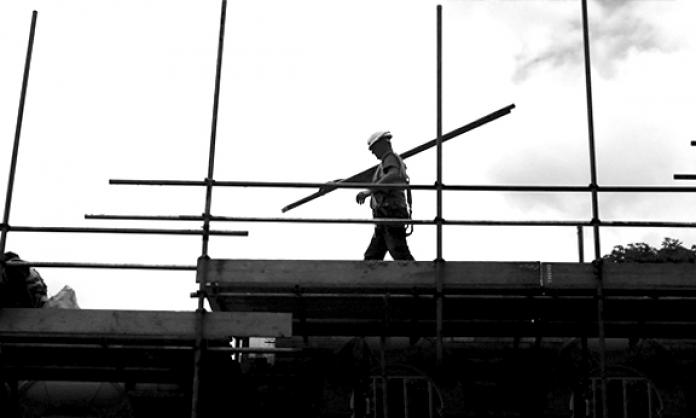When 700kg of steel and timber came crashing down, the whole site heard it.
Some of us raced around to where the formwork stripping gang was working. A forklift had been holding up a massive, prefabricated formwork table made of steel and plywood. But as the operator lowered the forks, the rotator on the front of the forklift had jumped loose. The table crashed down, from a height of five or six metres.
No one was injured – just shaken from having the best part of a tonne of steel and timber hit the ground a couple of metres away from where they were standing.
Incidents like this – near misses or near hits – are always a shock, but rarely a surprise in commercial construction. Even the best of us stuff up sometimes. But when slack maintenance and an even slacker WorkSafe enforcement regime combine with a “push push push” ethos from management, the results can be catastrophic – and often are.
This particular near hit happened in October 2005. With a couple of hundred others, I was working on yet another extension to James Packer’s Crown Casino complex in Melbourne. This dropped table stands out in my memory for a couple of reasons.
First, it was one of the more serious incidents during my dozen years working on site. And second – and in a way more startling – was the fact that, after this particular table dropped, work continued as normal.
In October 2005, this was all new. Up to that time, it was standard union practice for the whole site to stop anytime there was a serious safety incident. Workers would sit in the sheds until we got a report on the incident, discussed who or what had stuffed up, and heard how any injured workers were faring. After discussion, it was up to the workers to decide what to do. If it seemed to us that management’s cost cutting, negligence or “push push push” was responsible – which it was most of the time – we’d vote to walk off the job in protest for the day.
This policy was widely adhered to in commercial construction in Victoria. And it was effective. Nothing concentrates the mind of a building site foreman like the threat of lost production. Figures showed the rate of injury and death was lower on construction sites in Victoria than in the rest of the country. And every person in the industry knew that the threat of serious industrial consequences for a safety breach was the most important reason why.
Of course, in theory, the building companies could have prosecuted us, or the union, for these “illegal” work stoppages. But every building boss in Melbourne knew that even if they won in court, they would lose on the job. Any lack of industrial good will from the workers and our union had the potential to translate into lengthy, and therefore costly, delays.
All this changed in October 2005, with the introduction of the ABCC. Overnight, it was the ABCC, not the boss, who decided whether to prosecute. And the potential fines were colossal.
It had a dramatic effect. We got our introduction to it that day, in the perfunctory meeting and quick resumption of work, after 700kg of building material crashed down next to us.
Across the industry, builders and subcontractors started playing “catch me if you can” – and the industrial repercussions of getting caught were negligible.
The consequences were as sickening as they were predictable. In Victoria in 2005, for the first time in recorded history, there had been not a single fatality on a commercial construction site. Around the country, the death toll in the construction industry sank to 30 that year. The figure jumped by 50 percent to 43 in 2006 and then 46 workers dead in 2007. And everyone kept working.
The ability to stop work should be a basic right for any group of workers. In my time in construction, I was part of stop-works for health and safety, to back up fellow workers on site, but also to play a wider political role. In 2003, ahead of the US and Australian invasion of Iraq, the CFMEU held stop-work meetings on major construction sites in Melbourne to debate our union’s position on the war. On the day the invasion started, many city jobs stopped, and delegations attended the protest march.
When Labor was swept into power in late 2007, on a wave of disgust at Howard’s attacks on workers and unions, hopes were high that the ABCC would be scrapped – in accordance with Labor Party policy. However, Rudd and Gillard took the best part of five years to make any changes. Even then, it wasn’t to abolish, but to scale back, the powers of the ABCC and re-badge it Fair Work Building and Construction, still hailed by Gillard as “a tough cop on the beat”.
When Abbott was elected in 2013, he simply increased its budget, changed the director and instructed FWBC to prosecute anything that moved. It was a directive followed with gusto. At this moment, there are 17 active prosecutions against the construction union or individual construction workers. These cases were preceded by dozens of others which have already been finalised and millions in fines dished out.
In the decade since the ABCC came in, tens of workers have died unnecessarily on construction sites. Not one of their deaths has sparked an investigation or even comment from the “tough cop” on the construction industry beat. Not Gerry Bradley and Joe McDermott who, in December, were crushed to death on a Jaxon Construction building site in Perth. The CFMEU says Jaxon often refuses its officials entry to its sites to check on safety. This is illegal under the government’s own laws.
But predictably, Turnbull is targeting, not the bosses responsible for these abuses, but the one defence workers have against them – a fighting union that is prepared to stop the job.











